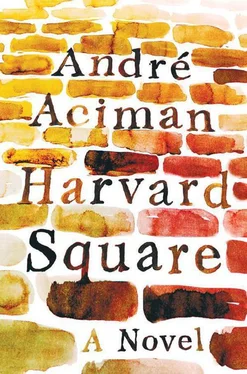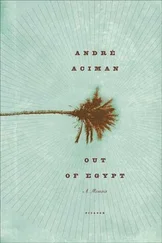The evening started on the wrong foot. Earlier, while Kalaj was busily cooking the meat with all manner of diced vegetables, and Ekaterina was helping with the salads and the vegetables, we heard the voice of Maria Callas on the radio singing one aria after the other. This was quite unusual until the announcer said what I was beginning to dread. Maria Callas had died that day in Paris. It put a damper on everything. My ex-roommate’s girlfriend and I were both fans. Count, as Kalaj suddenly dubbed him, thinking it was his first name even though he’d introduced himself as Piero, was beside himself, since his father had been a lifelong friend of hers and had her signed portrait in his office. The talk turned to Callas, and because I owned a few recordings, I decided to play two to three arias, trying as best as I could to explain why she was prima donna assoluta . A comparison of a few arias sung by other sopranos was meant to drive the point home.
Kalaj, who had nothing to say on the subject, was unusually quiet for a man used to brandishing his loud weaponry wherever he went. Asked by Léonie why he wasn’t speaking, he simply put on an affected simper that was meant to call attention to its contrived character. “Me, I’m listening,” he replied. “I like to listen.” But I could tell that he was seething inside and, without instant recourse to his Kalashnikov, had lost his ability to say anything. This was probably not the scene he had imagined, and he must have felt like an outsider at his own dinner party. Ekaterina began to talk to him, trying to draw him out, but he’d lapse into silence as soon as he uttered a few words. Something was clearly bothering him. Zeinab finally put her arm around him: “ Tu boudes, are you sulking?”
“I am not sulking,” he said, shrugging his shoulders to free them of her arm. “Just leave me alone, will you?” We left him alone.
We changed topics and someone spoke of a movie he had just seen called The Lacemaker about a humble, self-effacing apprentice who works in a beauty salon and who becomes the mistress of an intellectual who soon tires of her and ends up dropping her. This was more to Kalaj’s liking, and right away, he had loaded and cocked his gun, ready to aim and fire, and was soon inveighing both against all women for wanting to rise in the world by exploiting men and against all young men for exploiting the women who exploited them. There were no prisoners, everyone was being mowed down.
Kalaj and Léonie, however, disagreed. Claude, clearly happy to have brought along a count and still eager to shine in his eyes, said this was a circular argument and was headed nowhere. But Count was willing to be more indulgent and said that history was filled with similar instances and that it was no longer possible to take sides, but if sides had to be taken, he’d side with the woman. “Why with the woman and not the man?” Rat-tat-tat-tat. Because in the end men are frequently given second chances, women seldom are. “Are you so sure that men get second chances — are you so sure?” Rat-tat-tat-tat-tat.
“I think everyone in this room will agree with me.”
“And what about the men who always give women a second chance but are never given a second chance, what about them?” Rat-tat-tat-tat-tat-tat-tat-tat.
“I am not competent to comment on this, sorry.”
“Not competent, not competent, I’ll tell you why you’re not competent. Because you’ve never really had to help anyone, man or woman. What do you know about poor girls from the country or from another country who land in strange, big cities and whose last recourse is always the same— le trottoir , the sidewalk — what could you possibly know except as a consumer, and even then, what does a consumer know about the exploitation of women after he’s said au revoir et merci, or of the exploitation of men, because, yes sir, there are men who exploit men in that very same way among the dockers in Marseilles.”
“How do you know?” asked Count.
“I know, and how!”
The skirmish between the two men would have devolved into something ugly if the large pot with the meat didn’t require Kalaj’s attention. Moments later, the food was ready and everyone was urged to sit down around a table that could handle no more than four persons. People sat on the sofa, on the floor. We improvised a chair by using a tiny stepladder I’d found on the street; Zeinab could use it as a stool. I had an impulse to go downstairs and invite the twins from Apartment 21, but then thought better of it. As for the neighbors across the service entrance, I had no doubt that they knew a party was going on. Had they wanted to, they could have invited themselves. We drank lots of wine, and thank goodness Frank had prepared enough baked lasagna for a regiment, because we would have moved from the beef and the chestnuts and vegetables to the breads and cheeses without much of anything else in between. Kalaj was ecstatic and kissed Frank on his shimmering bald pate. “One doesn’t sit around a table for the food only. Food is there to feed friendship,” he said. I don’t think any of us understood the wisdom of the saying, but it sounded good, and perhaps we were all in the mood to believe just about anything that spoke well of friends and good fellowship. Count had brought many goodies from some hilly area in Umbria, and no one doubted that this had turned into a feast far, far superior to the tiny supper originally planned.
At some point, a song I had long ago taped on a tiny cassette came on, and Kalaj immediately pricked up his ears and asked us to be quiet for a moment because he wanted to hear the words. He hadn’t heard the song in a very long time, he said. “A very long time,” he repeated. Then, having caught the right words and synced his lips to the singer’s as he sometimes would with Om Kalsoum at Café Algiers, he began to whine the words ever so softly, as though he was ashamed of being seen singing, because for all he knew, he was just singing to himself because he needed to hear the words from his own mouth for him to feel them. The song was about a man thinking of a woman he hasn’t seen in a very long time but whom he knows he’ll meet again when their paths cross. The path to each is crooked and filled with detours — she’s met other men, and he’s met women too — but he knows that eventually they will meet and make love and speak of the incidental lovers each had loved along the way.
“This is not necessarily about a man and a woman,” said Frank, “It could be about a man who’s lost his way and decides to give his homeland a woman’s name. The woman is just a metaphor for home.” Kalaj listened attentively. Had Count said such a thing he would have strafed him with a machine gun filled with ire and contradiction, but coming from Frank, the comment seemed to placate something very deep in Kalaj. “The woman is a metaphor for home,” he said, echoing Frank’s impromptu remark, “the woman is a metaphor for home,” he repeated. Then he asked me to play the song again. But before the second stanza started, he suddenly rushed out and headed straight into the kitchen.
When he came back and Zeinab had started serving the Armenian desserts and the mousse, Léonie could still be heard carrying on about the woman who had sacrificed her life for a man who’d outgrown her too soon.
Léonie and Count agreed that the issue wasn’t as simple as all that. Kalaj disagreed. Why they had resurrected the topic wasn’t clear at all, especially after the song we’d heard had put him in so contemplative a mood. But as soon as it became obvious that Count had joined forces with Léonie, Kalaj left the table, went into the bedroom, and slammed the door behind him. Maybe he was making a phone call, maybe the food wasn’t agreeing with him. Zeinab seemed perplexed but didn’t say anything, and the Armenian girl and Frank kept exchanging mystified looks, all the while determined to sample their desserts and stay out of the Tunisian’s bad temper. Something was definitely wrong. A few moments later, I opened the door slowly and stepped into my bedroom. He had not only shut the door but had turned off the lights and was lying on my bed in total darkness, smoking.
Читать дальше












